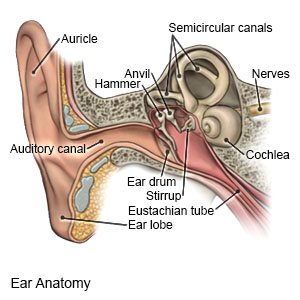Acoustic Neuroma Microsurgery
Medically reviewed by Drugs.com. Last updated on Aug 4, 2025.
WHAT YOU NEED TO KNOW:
Acoustic neuroma microsurgery is used to remove a tumor from nerves in your ear. The nerves help control your balance and hearing.
 |
HOW TO PREPARE:
The week before your surgery:
- Arrange to have someone drive you home when you are ready to leave the hospital.
- You may need to have a CT scan, MRI, or x-ray of your neck. You may need an audiometry hearing test and a speech discrimination test.
The night before your surgery:
Healthcare providers may tell you not to eat or drink anything after midnight.
The day of your surgery:
- You or a close family member will be asked to sign a legal document called a consent form. It gives healthcare providers permission to do the procedure or surgery. It also explains the problems that may happen, and your choices. Make sure all your questions are answered before you sign this form.
- Healthcare providers may insert an intravenous tube (IV) into your vein. A vein in the arm is usually chosen. You may be given liquids or medicine through the IV.
- An anesthesiologist will talk to you before your surgery. You may need medicine to keep you asleep or numb an area of your body during surgery. Tell healthcare providers if you or anyone in your family has had a problem with anesthesia in the past.
- Medicines may be given to help prevent an infection or to decrease inflammation.
WHAT WILL HAPPEN:
What will happen:
- Your surgeon will make an incision behind or above your ear. He or she will make an opening in your skull. Part of your skull may be removed to help your surgeon see your inner ear. Bones of your inner ear and behind your ear may be removed. Monitoring will be done to decrease the risk for damage to your nerves and other areas of your brain. Your surgeon will then remove the tumor.
- If a piece of your skull bone was removed for surgery, it will be put back and secured. The surgery area will be closed with stitches.
After your surgery:
A tight bandage will be placed over your incision to prevent bleeding. The bandage will also help keep the area clean and dry to prevent infection. You will be taken to a room or an intensive care unit (ICU). Healthcare providers will watch you closely for any problems. Do not try to get out of bed until your healthcare provider says it is OK. Your healthcare provider may remove the bandage shortly after surgery to check your incision. You may need an audiometry test and CT scan within 1 week.
Seek Care Immediately if
- Your face suddenly feels numb, or you cannot move parts of your face.
- You suddenly have a severe headache.
- Your hearing loss worsens suddenly.
Risks
Your brain, eyes, bones, blood vessels, or nerves may be injured during surgery. If a nerve is injured, you may need to have another surgery to repair it. You may have trouble moving your facial muscles or lose feeling in your face. You may have hearing loss, headaches, tinnitus, trouble seeing, or problems with balance. Cerebrospinal fluid (CSF) may leak out of your surgery site or from your nose. You may have a stroke or a blood clot in your leg or arm. If your tumor is not completely removed during surgery, it may grow back.
Related medications
Care Agreement
You have the right to help plan your care. Learn about your health condition and how it may be treated. Discuss treatment options with your healthcare providers to decide what care you want to receive. You always have the right to refuse treatment.© Copyright Merative 2025 Information is for End User's use only and may not be sold, redistributed or otherwise used for commercial purposes.
The above information is an educational aid only. It is not intended as medical advice for individual conditions or treatments. Talk to your doctor, nurse or pharmacist before following any medical regimen to see if it is safe and effective for you.
Further information
Always consult your healthcare provider to ensure the information displayed on this page applies to your personal circumstances.
